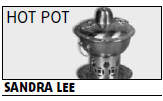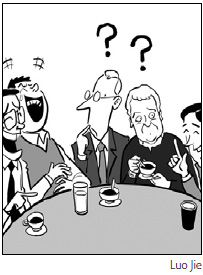What a sparkle to my morning dose of this paper
By Sandra Lee ( China Daily ) Updated: 2010-01-27 08:58:08
"Kerfuffle" is a funny Scottish word used to describe a fuss over something that is not very important. One would never use the word to describe any kind of violence. So a funny word is, I think, the perfect word to use to describe all the fuss and feathers over the recent "humorous" column by Huang Hung (see China Daily, p18, Jan 5).
I read it and laughed out loud. I loved it for two reasons. One, I love satire, sarcasm, irony, a play on words and a bit of morbid humor. The second is that it is rarely found in my morning reading of the China Daily. Now we see why.

I used to teach advanced adult students without a textbook. It was up to me to design classes that would bring them past the type of information and English they found in textbooks.
In that spirit, I spent a lot of time developing a class on "Humor". I found examples, researched "The Year's Funniest Jokes", cut out cartoons, had dialogues that were, in fact, the telling of jokes and I enlisted the aid of a Mr. Bean video.
I should have spared myself the trouble. The students' response was utter confusion. I dropped it after a couple of tries.
It isn't as if I wasn't tipped off. Two Chinese teachers whose command of English is excellent would come into our teacher's room exclaiming: "I have a joke!"
When they ended, the Chinese staff would be rolling on the floor laughing, while the foreign teachers would groan and beg them not to proceed.
Conversely, when a foreign teacher came in to share a "good one", the Westerners would be howling with laughter and our Chinese colleagues would be looking bewildered, their expressions clearly saying: "What the heck was funny about that?"

My students' reaction to my "Humor" lessons taught me what I should have already learned in the teacher's room.
Humor just doesn't translate. Mr. Bean was the only exception. And we all know if you have to tell someone what is funny, it just ain't funny.
Because I love to laugh, I have thought about this quite a lot. I have dear Chinese friends with whom I can share a lot - just not much of what tickles my funny-bone in daily life, since I use a lot of sarcasm, which sounds just plain mean to them.
The reverse is also true. Since I don't speak Chinese, I no longer ask for a translation when all are laughing around me. They can tell me, but usually I won't "get it".
It turns out that humor largely depends on culture and plays on words. I read Yu Hua's book Brothers and laughed a lot because I've lived here for so long and I "got" some of his allusions. If I spoke Chinese, most pages would have given me at least a chuckle if not an outright guffaw.
Although it is one of my favorite books, I only recommend it to other laowai if they have lived here a long time. If you don't get what's funny about it, the story would seem ludicrous.
I praise Huang Hung for writing her column and the China Daily for publishing it. A bit of a kerfuffle can get us all thinking and talking and there's no better bridge to understanding than paying attention to all the different points of view.
Humor lets us look at life and have a laugh, often at ourselves. It keeps us from arrogance and pomposity and taking ourselves too seriously.
Hard to fault that, eh?
|
|
|
|
|
|
|
|


























 Raymond Zhou:
Raymond Zhou: Pauline D Loh:
Pauline D Loh: Hot Pot
Hot Pot Eco China
Eco China China Dream
China Dream China Face
China Face






